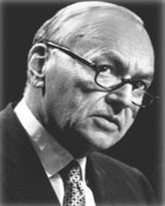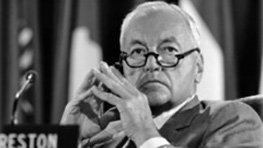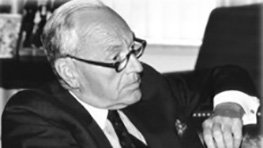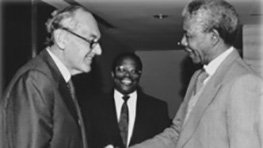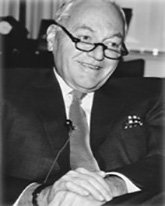8th President of the World Bank Group, September 1, 1991 - May 4, 1995
Preston saw occur many events of significance to the World Bank: the admission of the republics of the former Soviet Union to Bank membership, the initiation of lending programs in the newly democratic South Africa, the resumption of lending operations in Vietnam, the influx of private sector capital into developing countries, the criticisms of the non-governmental organizations, the Wapenhans Report on Portfolio Management, the Morse Commission report on Sardar Sarovar, the Main Complex Rehabilitation Project, the Business Innovation and Simplification (BIAS) Committee, and the establishment of the Inspection Panel.
He declared that alleviating poverty would be the Bank's "overarching objective", and said that applications for loans would be judged on a nation's social justice record as well as its economic efficiency. Preston emphasized the quality of lending over the quantity of lending. He reaffirmed that sustainable poverty reduction was the overarching objective of the World Bank, and led the institution through one of its most turbulent eras.
Personal History
Lewis Thompson Preston was born on August 5, 1926 in New York. He served in the Pacific as a U.S. Marine during World War II. He graduated from Harvard in 1951 with a degree in history, and was the Captain of the Olympic Hockey team in 1948. He joined J.P. Morgan as a trainee in 1951. He was appointed head of the London office in 1966, just as Morgan and other multinational banks were establishing a presence in the Euro markets.
He was named executive vice president for international banking in 1968 and saw Morgan through the boom years of globalization and the subsequent sovereign debt crisis, conducting negotiations with Latin American countries over the issue of their accumulated debts. He became vice chairman of Morgan's board in 1976 and became president in 1978 and chairman and chief executive office in 1980.
He stepped down as CEO in 1989, but remained chairman of the executive committee until he left for the World Bank. He became recognized as one of the leading Wall Street bankers of his time. He built up Morgan's international and advisory business and confirmed it as a top-class investment bank. He helped ensure Morgan's remarkably little-scathed emergence from the turbulence of the international debt crisis. He transformed Morgan into an international power, and played a major role in resolving the debt problems of developing countries. He shaped not only Morgan, but also the course of the industry in which it operated, providing a steadying hand for an industry undergoing immense change.
Lewis Preston was a private and reticent man. He disliked large formal gatherings. But he could be sharp and lively in smaller groups. Colleagues found him to be witty, playful, mischievous, yet constantly thoughtful of companions and coworkers. His management style was taciturn, quizzical, coolly demanding and startlingly quick. Gentle and courteous in manner, he exuded a reassuring presence that served him well during crises.
Political, Economic and Institutional Context
Preston's tenure saw significant changes in international politics. The Soviet Union was dissolved, and the former members in Eastern Europe and Central Asia became independent nations. East and West Germany became a unified country. Cambodia was restored to a constitutional monarchy. Nelson Mandela was elected president in South Africa, and apartheid was abolished. Middle East tensions continued; in 1993 Israel signed a peace agreement with the PLO. Palestinian self-rule was expanded and Israeli troops began a withdrawal from the West Bank. The assassination of Prime Minister Rabin and continuing violence caused a breakdown in the peace process. U.S. troops invaded Iraq and Kuwait; entered Somalia on an ultimately unsuccessful humanitarian mission; and intervened in Haiti to restore President Aristide to power.
Preston inherited an institution traumatized by recent internal changes and beset by external critics. The Bank had been traumatized by a failed reorganization that commenced in 1987. There was confusion about the Bank's role as a multilateral donor in a world of plentiful private capital; groups such as "Fifty Years is Enough" claimed that the Bank's role was redundant when private capital was so abundant. The upcoming membership of the former communist countries was about to place great demands - and accompanying mandates - upon the institution. In addition, the criticism of the Bank, coinciding with the Bank's fiftieth anniversary, was growing increasingly strident, culminating in large protests during the Annual Meetings in Madrid.
Role of the Bank
Mr. Preston approached all of these problems in a direct pragmatic manner, concentrating on immediate objectives rather than long-term visions. His chief objectives were to make the Bank more flexible, more cost-effective, and more responsive to prevailing social concerns. He stated that the key to success for the World Bank depended on its ability to respond to the changes in the world and to execute its administrative role accordingly.
At a time when private capital was increasingly available for investment, critics (many within the U.S. government) questioned the validity of the Bank's role. At his first Annual Meetings speech in Bangkok, Preston affirmed his vision of the role of the Bank. The Bank's "overarching objective" was the reduction of poverty. The end of the Cold War and the increasing political and economic liberalization offered unprecedented opportunities for this. He saw a place for both private and public sector: "Governments must assume those economic tasks which markets cannot; markets should be relied upon for the production and distribution of most goods and services. Striking a market-friendly balance ensures more efficient use of both private and public resources." With his concern with the efficacy of the Bank's operations, Preston strengthened social sector lending.
Environmental Issues
When Preston assumed membership, the Bank faced an array of external criticism focusing on the effects of the Bank on the environment. To counter this criticism, Barber Conable, Preston's predecessor, instituted measures to improve the Bank's performance in the environmental field, including the establishment of an Environment Department to oversee the Bank's work. An effort which came to fruition during Preston's tenure was the Global Environment Facility (GEF), a cooperative program among the World Bank Group, the United Nations Development Program (UNDP), and the United Nations Environment Programme (UNEP). The GEF agreement was formalized in October 1991, and the first grant for environmental projects was made in December of that year.
Closely related to the environmental program were actions relating to resettlement and indigenous peoples. Just before Preston became President, the Bank Group had commissioned an independent study, headed by Bradford Morse, of the controversial Sardar Sarovar (Narmada) projects in India. The Morse Commission report came out during Preston's tenure, saying that the Bank Group's performance on resettlement and environmental issues had "fallen short" of the stated policies and guidelines.
Preston urged vigorous action to remedy the shortcomings. (However, the proposed remedial actions ultimately were deemed unworkable, and the Bank Group withdrew from the project in 1995.) In 1992, the Bank instituted a major review of its resettlement activities, and published the results as Resettlement and Development: the Bankwide review of projects involving involuntary resettlement 1986 - 1993.
Concern over the effects of the Bank's projects on indigenous peoples also began to play an important role in Bank Group project appraisal. The Bank Group joined the UN General Assembly in promoting 1993 as the International Year of the World's Indigenous Peoples. Programs were established to create partnerships between international organizations, governments, non-governmental organizations, and indigenous organizations to improve the conditions of indigenous populations. The Bank sponsored a number of events to highlight this theme, and instituted operational policies to ensure the protection of indigenous peoples.
Inspection Panel
The Morse Commission served as a prototype for a new Bank institution established by Preston. In 1993 the independent Inspection Panel was created with the mandate to receive and investigate complaints that the Bank had not followed its policies and procedures with respect to the design, appraisal or implementation of development projects. The first panel members were appointed in April 1994, and the first project investigated by the Inspection Panel was the Arun III Hydroelectric Project in Nepal. The Inspection Panel agreed with the claimants, and in 1995 the Bank withdrew from the project due to its expected adverse fiscal impact, lack of implementation capacity, and the withdrawal of other donors. The Inspection Panel continues its work, and issues its decisions and procedures on a public website.
Expanding Membership
Preston oversaw one of the most dramatic increases in membership in World Bank Group history. The opening of Eastern Europe was the primary cause of this increase, and Preston began discussions with Soviet President Gorbachev, and then Russian President Yeltsin, within two months of his appointment. Bank Group membership increased in all geographical regions: IBRD membership increased by 24 countries, Ĺ·ĂŔČŐb´óƬ membership increased by 20 countries. IFC and ICSID increased by 23 members and 21 members respectively. MIGA experienced the largest growth, from 66 members when Preston assumed the presidency, to 129 members at the close of his tenure - almost doubling in size.
During the Preston presidency many of these new members received their first financing from the World Bank Group. Many of these loans reflected the transition from socialist to market economies: Technical Assistance (4), Critical Imports, Rehabilitation loans (8), Institution Building (6), and Economic Recovery.
During this period the Bank also increased its presence in member countries by establishing resident missions. New resident missions were established in Moscow, Nicaragua, Egypt, Bulgaria, Romania, Budapest, Albania, Uzbekistan, Jamaica, and South Africa.
The rapid increase in membership necessitated an increase in staff positions, and a partial reorganization of the Bank. A new regional vice presidency was created - Europe and Central Asia - to accommodate the demands of the new members.
Bank Group Operations
Preston oversaw the resumption of lending to Vietnam and, after meetings with Nelson Mandela, the return of post-apartheid South Africa to the World Bank fold. He instituted a program of support for the West Bank and Gaza, and two separate trust funds were created to provide emergency rehabilitation, technical assistance and feasibility studies.
The private sector projects also increased during Preston's tenure. IFC received a capital increase of $1 billion in 1992. Preston improved the climate for private capital investment, and Bank lending to the private sector increased. The Bank also took a greater advisory role in the restructuring of public sectors in client countries.
Preston countered external criticism of the Bank by taking steps to improve transparency in Bank operations. During his tenure a new policy on the disclosure of information was issued, and the Bank's first public information centers were established. He encouraged open discussion with civil society and non-governmental organizations in Bank operations. He supervised the Ĺ·ĂŔČŐb´óƬ-10 negotiations, which concluded in 1992 with pledges of $22 billion from donors who urged the Bank to concentrate on the poorest and least creditworthy nations, and to increase lending for social sector and poverty reduction programs.
Mr. Preston represented the Bank at the 1993 Hunger Conference, sponsored by the World Bank in Washington, and the Bank provided $20 million in grant funds for emergency food relief in East Africa. He strengthened Bank support for micro-level credit programs in order to expand the benefits of financing throughout the population.
Organizational Renewal
Mr. Preston concentrated on organizational renewal as well. He instituted a further reorganization of the Bank's structure, designed to overcome some of the problems created by the 1987 reorganization. He streamlined management structure and called for a simplified budgeting process. He created the Business Innovation and Simplification Committee to simplify and improve the Bank's business processes. He established large new units in the areas of human resources, environmentally sustainable development and the promotion of the private sector. A further step was to strengthen the bank's personnel and management function, virtually destroyed in the 1987 reorganization.
During his tenure, the Bank Group embarked on a major program to improve the internal information technology, reflecting the Bank's global communication needs. He called for a greater role for women in managerial roles in the World Bank Group. And he presided over the construction of a new headquarters building which resulted in over 4,000 staff moves over a six month period. The headquarters construction caused controversy due to unexpected cost overruns, and Preston promptly created an investigative team to examine the problems and report the results to shareholders.
Wapenhans Report
Since the McNamara presidency, the Bank had developed an unwritten "culture of approval" in which the quantity of loans approved was more recognized than the successful implementation and effectiveness of the loans. In response to charges that the Bank Group's work was ineffective in alleviating poverty, Preston commissioned an internal task force to study project effectiveness. The Task Force on Portfolio Management, headed by Willi Wapenhans, a former vice president, found that the quality of the supervision of projects had declined noticeably in the recent past. Basing his actions on the Task Force report, Preston drastically changed the emphasis in Bank lending by insisting that the Bank's performance be judged on the successful implementation of its projects instead of the mere quantity of loans.
Preston's Illness and Death
Preston's tenure at the Bank saw a steady deterioration in his health. In 1993 he underwent heart surgery in Washington. He was hospitalized during a trip to Seattle, Washington. In February 1995 he announced that he had been diagnosed with cancer; Managing Director Ernest Stern was appointed acting president in his absence. Three months later Preston died, at age 68.
